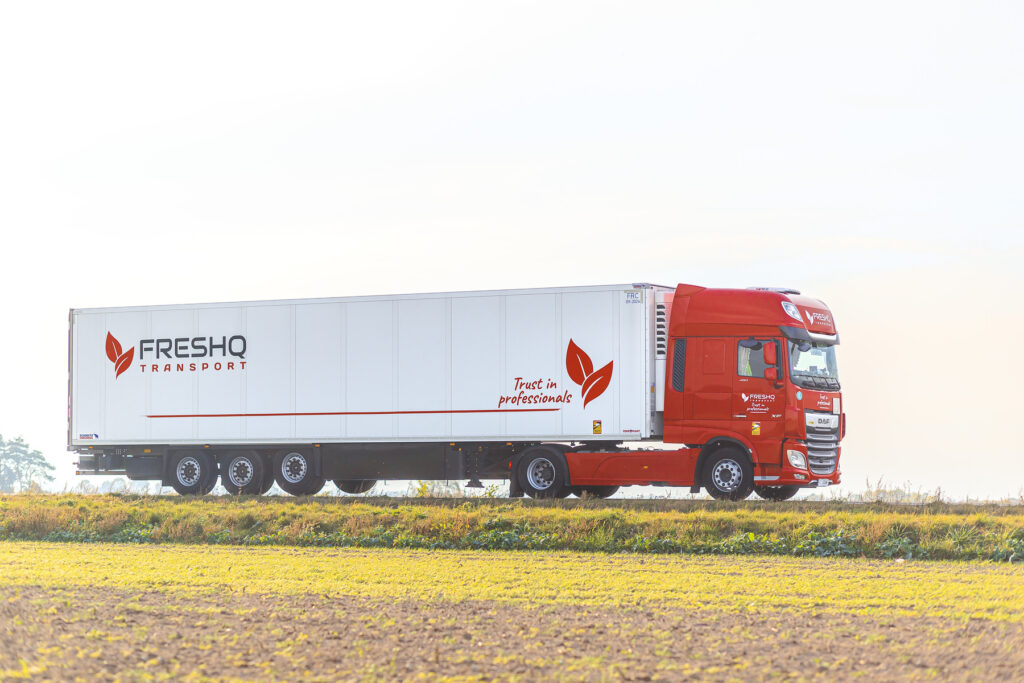Food and grocery products are very delicate goods, often perishable, so their transport requires compliance with strict quality requirements. Ensuring proper transport and storage conditions is a priority in the organization of logistics processes. The most frequently transported goods are vegetables, fruits, meat, dairy products and frozen products. In accordance with the terms of the agreement on the international transport of perishable foodstuffs and on special means of transport intended for such transport (ATP), transport must be carried out using special vehicles (refrigerated trucks), which must meet very demanding hygienic, thermal, strength and operational standards.
Fresh fruits and vegetables
A special group of products of plant origin are fruits and vegetables. They are very susceptible to storage and transport conditions, and their quality depends on many external factors, such as: temperature, humidity, percentage of carbon dioxide and oxygen in the air. They are very diverse in terms of physical characteristics, which means that their susceptibility to transport, storage and handling differ significantly. This is very important, especially when choosing the means of transport and packaging. A very important element that allows fresh products to maintain their high quality and all properties is the right temperature of the product during loading and maintaining its proper level during transport. Before loading, the temperature inside the body must be brought to the level specified in the transport order. After loading, arrange the goods in the cargo space in such a way as to maintain full air circulation. Remember about a small distance from the walls and roof, which requires the cooperation of the forlift operator and the driver.
Vegetables and fruits are a special category of food products of plant origin for one more reason. After harvesting, they do not stop to be living organisms. Biochemical processes such as respiration, change of chemical composition, transpiration, maturation, aging and re-growth continue to take place in them. With sufficient access to oxygen, the products of the respiration process are water, carbon dioxide and energy released to the environment in the form of heat. However, in conditions of too high temperature or oxygen deficiency, the process of anaerobic respiration takes place, the products of which are e.g. ethyl alcohol and acetaldehyde. This is a very dangerous process, as it leads to the deterioration of the raw materials. The intensity of respiratory processes in fruit and vegetables increases significantly as a result of mechanical damage and microbial infection. Therefore, damaged or diseased fruits and vegetables are not suitable for long-distance storage and transport
Meat
Meat is one of the most sensitive foodstuffs that require special transport and storage conditions. The most popular methods of meat preservation are cooling to a temperature of 0C to +3C and storage in a humidity of 88% to 92%. The second, equally popular method is freezing below -26C and storing at a temperature lower than -18C. On the other hand, meat products such as tinned meat, sausages, packaged meat products should be stored at a temperature of +2C to +10C in shaded rooms. Canned meat, products in hermetically sealed packaging (metal cans, glass jars, multi-layer foils) should be stored at temperatures from 0C to +6C or up to +18C. Pre-packaged meat products, i.e. portioned or sliced products packed in foil or plastic bags, must be stored in shaded conditions and at a temperature of +2C to +10C.
Dairy and eggs
Milk, a product of animal origin, which is extremely perishable, because it has perfect conditions for the multiplication of pathogenic microorganisms. On the other hand, eggs, due to their physical structure (the inner part of the egg is protected only by a thin shell), are extremely exposed to mechanical damage. Despite the widespread use of embossed cardboard or pulp packaging, the risk of damage during transport is still very high. A very important role is also played by the temperature, which should be from +8C to +13C with air humidity from 65% to 80%. Eggs should also be stored indoors, out of direct sunlight.
Frozen products
Frozen products are a special group of food products that require special storage and transport conditions. The freezing process is one of the most optimal methods of preserving plant products, it does not cause loss of valuable nutrients, ensures health safety and a long shelf life. All this makes these products more and more popular among consumers, and their transport is the key link in the cold chain. It is advisable to transport frozen food in the same conditions of humidity and temperature as are considered for the storage process.
The only exception in which the transport temperature may increase is when the refrigerated evaporator is defrosting, which causes the temperature to increase by 3C for a short period of time.
Trust in professionals for transporting food products!
FreshQ Transport has been specializing in the transport of products that require controlled temperature for many years. Our team has been gathering its experience in the food industry and food transport business for many years. Our processes have been constantly improved for years to meet the extremely high standards existing on the food market. Our offer includes a whole range of services dedicated to each group of food products, such as international transport, groupage transport on the Benelux - Poland line and storage services for food products.



